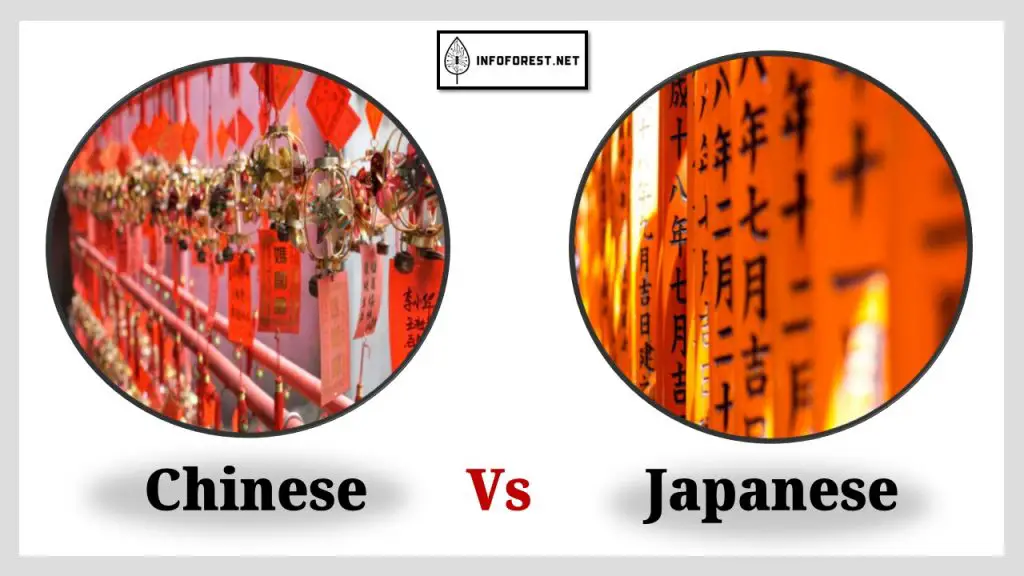
Chinese and Japanese are two distinct East Asian languages with different linguistic and cultural histories. While they have some similarities in terms of grammar and vocabulary due to historical influences, they are not mutually intelligible and have distinct differences in pronunciation, writing systems, and grammar.
Chinese is a language family of its own, spoken by over a billion people, primarily in China, but also in other countries such as Taiwan and Singapore. The most widely spoken variety is Mandarin, but there are also several other dialects including Cantonese, Shanghainese, and Hokkien.
Japanese, on the other hand, is a member of the Japonic language family and is spoken primarily in Japan. It has a unique writing system that combines three scripts: kanji (Chinese characters), hiragana, and katakana.
In terms of culture, China has a long and rich history, while Japan has a unique culture that is heavily influenced by Chinese culture but also has its own unique traditions and practices.
Overall, while there are some similarities between Chinese and Japanese, they are distinct languages and cultures with unique histories and traditions.
Chinese
Chinese is a group of related languages spoken primarily in China and Taiwan, but also in other countries such as Singapore, Malaysia, and Indonesia. The most widely spoken variety is Mandarin, which is the official language of the People’s Republic of China and the Republic of China (Taiwan). There are also several other regional dialects of Chinese, including Cantonese, Shanghainese, and Hokkien, each with its own unique pronunciation, vocabulary, and grammar.
Chinese is written using characters (or “hanzi” in Chinese), which are also used in Japanese and Korean writing. Mandarin Chinese uses a standardized form of pronunciation called pinyin, which helps learners of the language to pronounce words correctly.
Overall, Chinese is a rich and complex language with a long history, and it is the most widely spoken language in the world in terms of the number of people who speak it as their first language.
Japanese
Japanese is the primary language spoken in Japan, and it is a member of the Japonic language family. It has a unique writing system that combines three scripts: kanji (Chinese characters), hiragana, and katakana. This writing system allows the language to express complex ideas and nuanced meanings, while also incorporating elements of Chinese culture and literature.
The pronunciation of Japanese is distinct from other East Asian languages, with a syllable-timed rhythm and a limited number of sounds. The grammar of Japanese is relatively simple, with relatively few inflections and flexible word order, making it a relatively easy language for English speakers to learn.
In terms of culture, Japan has a rich and unique history, with a unique blend of traditional and modern elements. This is reflected in the language, which incorporates elements of Japanese folklore, religion, and philosophy, as well as more recent innovations in science, technology, and business.
Overall, Japanese is an important and distinctive language that is a key part of Japan’s cultural heritage and identity.

The main Differences Between Chinese and Japanese
Chinese and Japanese are two distinct East Asian languages with different linguistic and cultural histories. Some of the main differences between the two include:
- Writing system: Chinese uses characters (or “hanzi” in Chinese) to represent words, while Japanese uses a combination of three scripts: kanji (Chinese characters), hiragana, and katakana.
- Pronunciation: Chinese has a tonal system in which the meaning of a word can change based on the tone in which it is pronounced, while Japanese pronunciation is syllable-timed and has a limited number of sounds.
- Grammar: Chinese grammar is more complex than Japanese grammar, with a more elaborate system of particles and verb conjugations. Japanese has a relatively simple grammar system, with relatively few inflections and flexible word order.
- Vocabulary: While both languages have borrowed vocabulary from each other, Chinese has a much larger vocabulary, with a rich history of literature and culture. Japanese vocabulary, on the other hand, is heavily influenced by Chinese culture and literature but also has its own unique words and expressions.
- Cultural heritage: China has a long and rich history, with a diverse cultural heritage that is reflected in its language and literature. Japan, on the other hand, has a unique culture that is heavily influenced by Chinese culture but also has its own unique traditions and practices.
Overall, while there are similarities between Chinese and Japanese, they are distinct languages with unique linguistic and cultural histories.
Examples -Chinese Vs Japanese
Here are some examples of differences between Chinese and Japanese:
- Writing system: In Chinese, the word for “tea” is written as 茶 (chá) using characters, while in Japanese it is written as お茶 (ocha) using a combination of kanji, hiragana, and katakana.
- Pronunciation: In Chinese, the word for “mother” is pronounced “mā mā,” with a rising tone on the first syllable and a level tone on the second syllable. In Japanese, the word for “mother” is pronounced “haha.”
- Grammar: In Chinese, subject-verb-object word order is more common, while in Japanese the word order is flexible and subject-object-verb is also common. For example, in Chinese, the sentence “I love you” is “wǒ ài nǐ” (I love you), while in Japanese it is “私はあなたを愛しています” (Watashi wa anata wo aishite imasu).
- Vocabulary: While both languages have borrowed vocabulary from each other, there are words in each language that have no direct equivalent in the other. For example, the Chinese word for “renminbi” (人民币) refers to the official currency of China, while the Japanese word for “yen” (円) refers to the official currency of Japan.
- Cultural heritage: Chinese has a long and rich history, with a diverse cultural heritage that is reflected in its language and literature, such as the famous works of Confucius and Laozi. In contrast, Japan has a unique culture that is heavily influenced by Chinese culture but also has its own unique traditions and practices, such as the tea ceremony and the practice of samurai.
These examples illustrate some of the key differences between Chinese and Japanese, including differences in writing systems, pronunciation, grammar, vocabulary, and cultural heritage.
Comparison Table for Differences Between Chinese and Japanese
Here is a comparison table outlining some of the key differences between Chinese and Japanese:
| Feature | Chinese | Japanese |
|---|---|---|
| Writing system | Characters (hanzi) | Kanji, hiragana, katakana |
| Pronunciation | Tonal | Syllable-timed |
| Grammar | Complex | Simple |
| Vocabulary | Large, heavily influenced by classical literature and culture | Influenced by Chinese culture, but with its own unique words and expressions |
| Cultural heritage | Long and rich history, diverse cultural heritage | Unique culture heavily influenced by Chinese culture, but with its own unique traditions and practices |
Note: These are generalizations and may vary depending on the specific dialect or context.
Most Viewed Articles
Conclusion
In conclusion, Chinese and Japanese are two distinct East Asian languages with their own linguistic and cultural characteristics. They have different writing systems, pronunciation, grammar, vocabulary, and cultural heritage, which set them apart from each other. While there are similarities between the two languages, they are not interchangeable, and each has its own unique features that are an important part of its cultural identity. Understanding the differences between Chinese and Japanese can help to deepen appreciation for the linguistic and cultural diversity of the East Asian region.
We also invite you not to miss our other popular articles such as:
Difference between left and right Twix–Difference Between Eastern Time Zone and Central Time Zone–Difference Between Capitalism and Communism– Difference Between EST and EDT–How many weeks in a Year– Difference Between Evening and Afternoon – Democrat vs Republican – Kilometer vs Mile – How to get rid of hiccups What does TBH mean – What does NSFW mean – What does IG mean–What does CAP mean– What is normal blood pressure –What is the rarest blood type–Difference Between Hotel And Motel and Difference Between Zip Code and Postal Code–






